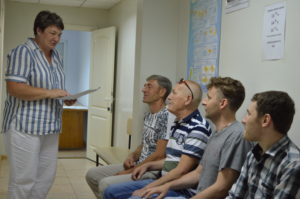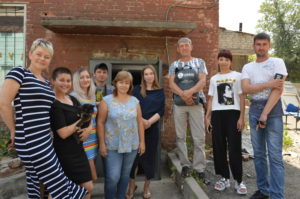Author: Marina Maximova, Kazakhstan
 Over the past three years, express HIV testing in key populations in the East Kazakhstan region of Kazakhstan increased by a third. Peer navigators play a very important role in this success.
Over the past three years, express HIV testing in key populations in the East Kazakhstan region of Kazakhstan increased by a third. Peer navigators play a very important role in this success.
Today among key populations, including people who use drugs, sex workers, men who have sex with me, etc. there is a major increase in infection in the country. Representatives of these groups usually don’t come to AIDS centers and medical facilities for testing, but, as experience has shown, they easily visit non-governmental public organizations (NGOs) or ask peer navigators for such services.
Peer navigators – who are they?
The term “peer navigators” is very popular among social activists. People living with HIV (PLHIV) become voluntary medical assistants and help professionals to care about patients. They do express testing for HIV infection in peri-gingival fluid, provide counseling, and, if necessary, accompany PLHIV to AIDS centers for complete testing.
“Another important work of peer navigators is to increase the motivation of PLHIV for the constant and systematic use of special antiretroviral therapy (ARVs), which is extremely necessary for our patients to improve their health, – says Marina Zhigolko, head of the East Kazakhstan Center for the Prevention and Control of AIDS. With the participation of volunteers, in recent years, PLHIV adherence to treatment has quadrupled. Today, more than 80 % of these people take rescue therapy and can work fruitfully, have families, give birth to healthy children”.
Today in the East Kazakhstan region there are 20 peer navigators. In the framework of the USAID Flagman project, they are provided with rapid tests, tablets for record-keeping, disposable syringes, lubricants, and promo materials.
Personal example and motivation
 Sergey Baranyuk, a peer navigator from the Answer public foundation, packs a backpack in the morning and sets off on his route to work “in the field”. He is an ex-prisoner, has been living with HIV for many years, he used drugs. Today Sergey has a family, a job, and he helps other people to overcome the life situation he had before. His life experience helps him to convince those who, for various reasons, fall out of medical control and are not tested for HIV.
Sergey Baranyuk, a peer navigator from the Answer public foundation, packs a backpack in the morning and sets off on his route to work “in the field”. He is an ex-prisoner, has been living with HIV for many years, he used drugs. Today Sergey has a family, a job, and he helps other people to overcome the life situation he had before. His life experience helps him to convince those who, for various reasons, fall out of medical control and are not tested for HIV.
“The express test for peri-gingival fluid is convenient to use,” says Sergey. It can be done on a bench in a park, in a car, at home. After 15-20 minutes, a person already knows his HIV status. While he is waiting for the result, a peer navigator can talk to him about the risks of behaviour, ways of transmitting HIV infection and precautions. ”
Trust on the Health Route
Over three years, with the joint work of peer navigators and health visitors in the East Kazakhstan region, the number of PLHIV on follow-up has doubled. People come for medical monitoring of health, testing and medication. Peer navigator work not only in the regional center, but also in villages. For example, some villages of Glubokovsky, Shemonaikhinsky, Ulan districts, as well as Ridder-city are also under the control of public activists.
Many people prefer to come for testing at an NGO. For this, for example, the public funds “Answer” and “Kuat” have specially equipped rooms. Here people can talk frankly and do a test.
The first six months are the most important in the work of peer navigators. After some time, patients start to understand the importance of treatment themselves. But before peer navigator should find a person from the risky behaviour group and convinces him to find out his HIV status and, if necessary, start treatment.
“Navigators are our ears, eyes and foot,” says Neil Mamyrbekova, head of the treatment department at the Semey AIDS Center. «One doctor is not able to single-handedly cover patients, set them up for treatment, and convince them in the possibility to start a new life. A person must come to us prepared, therefore navigators are our main assistants. They are trusted!»



